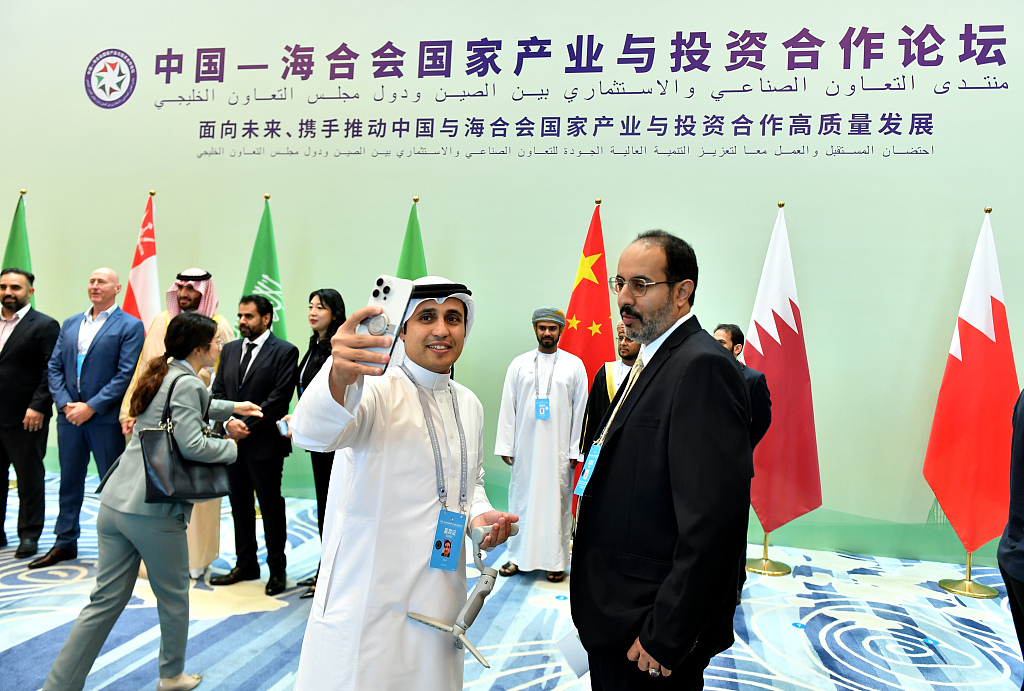China ready to boost oil ties with GCC


China stands ready to deepen cooperation with Gulf countries across the entire oil and gas industry chain, and open up new avenues for collaboration in the renewable energy sector including power batteries and photovoltaic facilities, officials and executives said on Friday.
By deepening their collaboration, both regions can reap the benefits of their complementary strengths and expertise to ensure a stable and diversified energy supply and foster sustainable development, they said at the ongoing China-GCC Countries Forum on Industrial and Investment Cooperation, which began in Xiamen, Fujian province, on Thursday.
Amid a complex and ever-changing international landscape and energy market dynamics, both China and the Gulf Cooperation Council nations face significant challenges in ensuring energy security and achieving energy transition, said Dong Xiang, deputy director-general of the National Energy Administration's international cooperation department.
Headquartered in Riyadh, Saudi Arabia, the GCC is a political and economic union of six Arab states — Bahrain, Kuwait, Oman, Qatar, Saudi Arabia and the United Arab Emirates — that border the Persian Gulf. Some of these are among the world's top fossil fuel exporters.
Energy cooperation is a crucial element of the pragmatic collaboration between China and GCC nations, given the abundant energy resources in the GCC countries and China's position as a major global energy consumer, Dong said.
In 2023, China imported about 201 million metric tons of crude oil and 18 million tons of liquefied natural gas from the GCC nations, representing around one-third and one-fourth of its total imports, respectively, according to data from the administration.
Despite the volatile and uncertain nature of the global energy market in the foreseeable future, oil and gas will continue to play a crucial role as the primary sources of global energy supply, said Zhang Pinxian, deputy director of the development and planning department of China National Petroleum Corp.
In response to this scenario, the company will expand oil and gas cooperation with Gulf countries beyond exploration and development into areas such as trade, engineering technology and project construction, to enhance the resilience and security of the oil and gas supply chain, Zhang added.
So far, the company has been involved in oil and gas field development in countries such as the UAE, Qatar and Oman, with participation in six oil and gas cooperation projects.
The energy cooperation between China and nations in the Gulf region extends far beyond traditional fossil fuels. As China and the GCC states continue to prioritize green transition, both sides are exploring avenues for collaboration in renewable energy, said Yuan Feng, director of the International Cooperation Center of the National Development and Reform Commission.
As a front-runner in green energy, China has focused on perfecting its industrial and supply chain to support the advancement of renewable energy technologies. Moreover, the country's large-scale production has helped drive down the costs of renewable energy technologies, making them more accessible and affordable for countries around the world, Yuan said.
Meanwhile, the member countries of the GCC have unveiled their development strategies, with a strong focus on diversifying their economic structures and reducing overreliance on traditional energy sources.
The GCC nations are committed to embracing the development of new energy sources, including solar power, wind energy, electric vehicles and hydrogen, as they strive to achieve sustainable and resilient economies, Yuan said, stressing that China's prowess will facilitate Gulf countries toward a smooth energy transition.
Saudi Arabia, renowned for its mature energy and petrochemical industries, is actively pursuing a transition in both energy and industrial sectors. As the state embarks on this transformative journey, it aims to create lucrative investment opportunities for investors worldwide, particularly those from China, said Khalid A. Al-Falih, minister of investment, Saudi Arabia.
Huang Mingang, chief economist of China National Nuclear Corp, said that China is leveraging its comprehensive nuclear industry supply chain and technical service capabilities to provide Arab countries with integrated nuclear energy solutions and full life cycle services.
Together, they aim to explore collaborations in coupling nuclear energy with heating systems, desalination processes, petrochemical industries and complementary renewable energy sources, Huang added.




































